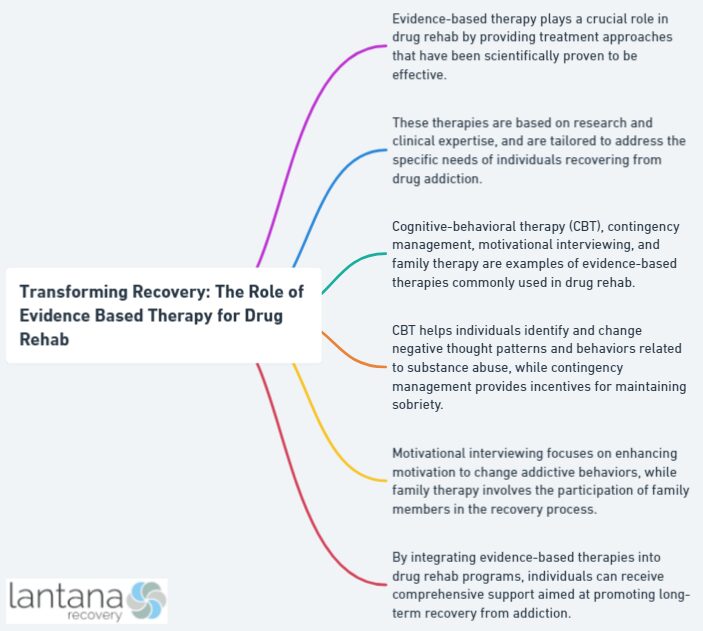Recovering from addiction is rarely a simple, straightforward journey. However, the transformative power of evidence based therapy for drug rehab has revolutionized programs, offering new hope for those struggling with substance use disorders. With a variety of research-backed treatments available, individuals have access to personalized, effective therapies that can significantly improve their chances of long-term recovery. But what exactly are these evidence-based therapies, and how do they work?
In this blog post, we will delve into the world of evidence based therapy for drug rehab, exploring their principles and benefits, and examining the most common forms used in programs. By understanding the potential of these therapies, we hope to inspire both individuals seeking help and those supporting loved ones on their path to recovery.
Key Takeaways
- Evidence-Based Therapy (EBT) in Drug Rehab applies research-supported interventions to provide highly efficacious and cost-effective care.
- Common EBTs include CBT, DBT and Motivational Interviewing, as well as family therapy for rebuilding trust between family members.
- Measuring the success of evidence based therapies involves assessing individual needs, tailoring treatment plans and monitoring progress with outcome measures.
Overview of Evidence-Based Therapy in Drug Rehab
The concept of evidence-based therapy (EBT) is rooted in the integration of research-backed approaches, clinical expertise, and evidence based medicine to enhance recovery results. Unlike traditional therapies, EBT is supported by a variety of research methods, including evidence based practice methods such as:
- Randomized controlled trials
- Case studies
- Meta-analyses
- Qualitative studies
These research methods yield evidence-based therapies, including evidence based psychotherapy, for mental health disorders and other mental health conditions, providing safe, consistent, and cost-effective treatment options.
The principles of EBT in drug rehab include utilizing research-supported interventions, tailoring treatments to suit individual needs, and monitoring progress throughout treatment. When mental health providers adhere to these principles, they enhance the recovery process by providing effective, personalized care, thus maximizing the chances of long-term success.
The Need for EBT in Drug Rehab
Substance use disorders are a global issue, affecting approximately 2.2% of the population. Traditional drug rehab methods, such as 12-step programs and group therapy, often lack scientific backing, leading to inconsistent results. In contrast, evidence-based therapies have demonstrated efficacy in treating addiction through rigorous scientific research. Incorporation of empirically supported treatments enables individuals in drug rehabilitation to receive highly efficacious and personalized care, thereby facilitating their recovery process.
Moreover, evidence-based treatments in drug rehab have been found to be cost-effective when compared to other health interventions. As a result, drug rehab programs that utilize evidence-based treatments offer a cost-effective solution for addressing substance abuse, making it increasingly important to incorporate these therapies into addiction treatment.

Principles of EBT in Drug Rehab
A key principle of EBT in drug rehab is the use of research-supported interventions, which are based on scientific evidence and have been proven to be effective in treating substance use disorders. Clinicians, who focus on therapies backed by extensive research and positive outcomes, can provide their patients with highly effective care.
Another essential principle of EBT is tailoring treatments to individual needs. This involves conducting an extensive assessment of the person’s substance abuse history, mental health status, social support system, and any co-occurring disorders. Subsequently, evidence-based treatment interventions are chosen and tailored to address the unique needs of the individual, such as medication-assisted treatment, cognitive-behavioral therapy, and family therapy. The objective is to provide a personalized treatment plan that optimizes the chances of successful recovery for each individual.
Common Evidence-Based Therapies in Drug Rehab

Three common evidence-based therapies used in drug rehab are Cognitive Behavioral Therapy (CBT), Dialectical Behavior Therapy (DBT), Medication Assisted Treatment, and Motivational Interviewing. Each of these therapies offers unique benefits and applications in the treatment of substance use disorders, addressing various aspects of addiction and recovery.
A comprehension of the basic concepts and techniques of these therapies, along with an understanding of patient characteristics, enables individuals seeking help, and their supporters, to make informed decisions about the most suitable treatment options for their unique circumstances.
Cognitive Behavioral Therapy (CBT)
Cognitive Behavioral Therapy (CBT) is a widely-used evidence-based therapy that focuses on addressing negative thought patterns and behaviors related to substance abuse. CBT helps individuals recognize and challenge these maladaptive thoughts and beliefs, teaching them to make connections between their thoughts, feelings, and behaviors.
CBT incorporates principles of behavior change to reduce or eradicate substance use through environmental and social reinforcement, making it a highly effective tool in addiction treatment and recovery. CBT addresses the underlying cognitive and behavioral aspects of addiction, generating positive results in recovery that foster long-lasting change.
Dialectical Behavior Therapy (DBT)
Dialectical Behavior Therapy (DBT) is an evidence-based therapy that focuses on emotional regulation and interpersonal effectiveness. Originally designed to treat individuals with borderline personality disorder, DBT has since been adapted for use in drug rehab settings, proving particularly beneficial for those with co-occurring mental health issues.
DBT involves four components:
- Individual psychotherapy
- Group skills training
- Phone coaching
- Ongoing support from a team of therapists
DBT, by teaching skills for emotion regulation, distress tolerance, and mindfulness, has proven to decrease substance abuse in patients with borderline personality disorder; a valuable addition to drug rehab programs.
Motivational Interviewing
Motivational Interviewing is a counseling approach that aims to help individuals examine and address ambivalence regarding changing their behavior. Founded on the principles of client-centered therapy, Motivational Interviewing uses techniques such as reflective listening, open-ended questions, and affirmations to help individuals recognize their own motivations for change.
Motivational Interviewing fosters a sense of empowerment and self-determination by focusing on the individual’s own desires and values, thus enhancing their motivation for change and commitment to recovery. This approach has been shown to be particularly effective in the early stages of addiction treatment, helping individuals to engage in and adhere to the therapeutic process.
The Role of Family Therapy in Drug Rehab

Family therapy plays a significant role in drug rehab, as it addresses the impact of addiction on the entire family system. Involvement of family members in the treatment process through family therapy can lead to improved communication, rebuilt trust, and strengthened relationships among family members, thus fostering a supportive environment for the individual in recovery.
In addition to enhancing family functioning, family therapy can also provide:
- Education and support to family members, helping them to understand the nature of addiction and develop healthy coping strategies
- Addressing the family dynamics and communication patterns that contribute to substance abuse
- Playing a vital role in supporting long-term recovery
Benefits of Family Therapy
Family therapy offers a range of benefits for individuals in drug rehab and their families, including improved communication, conflict resolution, and strengthened support systems. Family therapy helps create a supportive environment for recovery to thrive by addressing the impact of addiction on family dynamics and relationships.
Furthermore, family therapy for drug rehab can play a crucial role in the early stages of recovery, when individuals may be struggling to build trust and reestablish connections with their loved ones. Family therapy facilitates families to work through their challenges and rebuild stronger, healthier relationships by providing a safe space for open communication and the expression of emotions.
Evidence-Based Family Therapy Models
Evidence-based family therapy models, such as Multisystemic Therapy and Functional Family Therapy, have demonstrated effectiveness in treating substance use disorders. These models integrate elements of traditional family therapy with evidence-based practices, providing a comprehensive approach to address both addiction and family dynamics.
Multisystemic Therapy (MST) is an intensive family and community-based treatment approach designed for adolescents with substance abuse and dependency issues. Functional Family Therapy (FFT) is a short-term, family-based intervention that focuses on improving family functioning and communication. Both models have been shown to be effective in reducing substance abuse and improving overall treatment outcomes for individuals and their families.
Integrating Evidence-Based Therapies in Drug Rehab Programs

Integrating evidence-based therapies into drug rehab programs involves a systematic approach that combines the best available research with clinical expertise and patient preferences. Through a comprehensive assessment of the individual’s substance abuse history, mental health status, and personal goals, treatment providers can select the most appropriate evidence-based therapies and tailor them to the individual’s unique needs.
By incorporating a variety of evidence-based therapies, drug rehab programs can provide a comprehensive, personalized approach to addiction treatment, maximizing the chances of long-term success and improving overall quality of life for individuals in recovery.
Assessing Individual Needs
Assessing individual needs is a crucial aspect of integrating evidence-based therapies into drug rehab programs. This process involves:
- Evaluating the severity of the substance use disorder
- Identifying any co-occurring mental health issues
- Taking into account personal preferences and strengths
Treatment providers, through thorough assessment of an individual’s needs, can select the most appropriate evidence-based therapies for each person, thereby maximizing the chances of successful recovery. This personalized approach to treatment allows for greater flexibility and adaptability, ensuring that individuals receive the most effective care possible.
Tailoring Treatment Plans
Tailoring treatment plans involves:
- Selecting appropriate evidence-based therapies
- Adapting therapies to the individual’s unique circumstances and needs
- Modifying the duration or intensity of a particular therapy
- Incorporating additional support services
- Adjusting treatment goals to better align with the individual’s personal objectives.
Treatment providers enhance overall quality of life for those in treatment and support long-term recovery by customizing treatment plans to suit the specific needs and preferences of each individual, ensuring that evidence-based therapies are as effective as possible.
Challenges and Limitations of Evidence-Based Therapies in Drug Rehab

While evidence-based therapies offer significant benefits for individuals in drug rehab, there are also challenges and limitations to their implementation. Barriers to implementation may include limited resources, lack of training, and resistance to change among providers. Additionally, addressing individual differences can be a challenge, as individuals have unique needs and preferences that may not always align with established evidence-based practices.
Despite these challenges, the continued development and integration of evidence-based therapies in drug rehab programs remain essential for improving treatment outcomes and supporting long-term recovery.
Barriers to Implementation
Limited resources can pose a significant barrier to the implementation of evidence-based therapies in drug rehab programs. This may include:
- Restricted access to qualified professionals
- Inadequate funding for essential resources and equipment
- Limited support for ongoing training and supervision
Additionally, lack of training and resistance to change among providers can hinder the adoption and implementation of evidence-based therapies. To overcome these barriers, it is important to:
- Promote the value of evidence-based therapies
- Provide ongoing professional development opportunities and support
- Encourage open-mindedness and adaptability among treatment providers.
Addressing Individual Differences
Addressing individual differences is a crucial aspect of implementing evidence-based therapies in drug rehab programs. This involves recognizing and adapting to the unique needs, preferences, and circumstances of each individual, ensuring that treatment plans are tailored to provide the most effective care possible.
Flexibility and adaptation are key in addressing individual differences, as diverse populations and needs may require modifications to established evidence-based therapies. Addiction treatment providers like Lantana Recovery can ensure that evidence-based therapies remain effective and relevant for all those in recovery by staying open to change and focusing on the specific needs of each individual.
Measuring the Success of Evidence-Based Therapies in Drug Rehab
Measuring the success of evidence-based therapies in drug rehab is essential for ensuring the continued effectiveness of these treatments and supporting long-term recovery. This involves using outcome measures to evaluate treatment progress and adjusting treatment plans as needed to ensure optimal results.
Regular assessments and progress monitoring can help to identify areas of improvement, highlight successes, and provide valuable feedback for both individuals in recovery and their treatment providers. Evidence-based therapies can continue to support individuals on their journey to recovery and improve their overall quality of life by closely monitoring progress and adapting treatment plans as needed.
Outcome Measures
Outcome measures are important tools for evaluating the success of evidence-based therapies in drug rehab. These may include reductions in substance use, improvements in mental health, and increased quality of life. Treatment providers gain valuable insights into the effectiveness of their interventions and can make informed decisions about adjustments to treatment plans by tracking these outcomes.
It is important to consider multiple factors when evaluating treatment success, as individuals may experience different outcomes depending on their unique circumstances and needs. By taking a comprehensive approach to measuring success, treatment providers can ensure that they are providing the most effective care possible and supporting long-term recovery.
Monitoring Progress
Monitoring progress throughout treatment is crucial for ensuring the continued effectiveness of evidence-based therapies in drug rehab. This involves:
- Conducting regular assessments of the individual’s progress
- Evaluating the efficacy of the current treatment plan
- Making necessary adjustments to ensure that it remains suitable and effective.
Treatment providers can ensure individuals receive the most effective care possible, maximizing the chances of successful recovery and long-term sobriety, by closely monitoring progress and adapting treatment plans as needed. This ongoing process of evaluation and adjustment is essential for maintaining the high standards of care associated with evidence-based therapies.
Summary
In conclusion, evidence-based therapies play a crucial role in transforming recovery for individuals struggling with substance use disorders. By incorporating research-backed treatments and tailoring treatment plans to individual needs, drug rehab programs can provide a comprehensive, personalized approach to addiction treatment, maximizing the chances of long-term success and improving overall quality of life for those in recovery.
As we continue to develop and refine evidence-based therapies, it is essential that we remain committed to evaluating their success, addressing challenges and limitations, and ensuring that these powerful tools remain accessible to all those in need. In doing so, we can create a brighter future for individuals and families affected by addiction, one step at a time.
Frequently Asked Questions
What is the evidence-based treatment strategy?
Evidence-based treatment (EBT) is a strategy that combines scientific research and patient factors to develop effective treatment plans. It ensures that the best available evidence is used as a starting point for complex treatments, enhancing the professional skills of the therapist.
What strategies are most effective for treating substance abuse?
Treatment for substance abuse disorder typically includes therapy sessions, levels of care, and prevention measures. Common strategies used include self-monitoring, goal setting, rewards, stress management, information dissemination, prevention education, alternatives, problem identification and referral, community-based processes, and environmental approaches. Together, these strategies can be very effective in treating substance abuse.
What are three organizations that assist people who are affected by alcoholism?
Alcoholism Support Groups, Alcoholics Anonymous (AA), Al-Anon and Alateen, and SMART RecoveryTM are three organizations that can assist people affected by alcoholism.
How are individual needs assessed in drug rehab programs?
Individual needs are assessed in drug rehab programs through a comprehensive assessment of the individual’s substance abuse history, mental health status, social support system, and any co-occurring disorders to provide tailored treatment plans.
What are the main challenges and limitations of implementing evidence-based therapies in drug rehab?
Implementing evidence-based therapies in drug rehab can be challenging due to limited resources, lack of training, and resistance to change among providers. Additionally, individual differences and needs among diverse populations must be taken into consideration.



